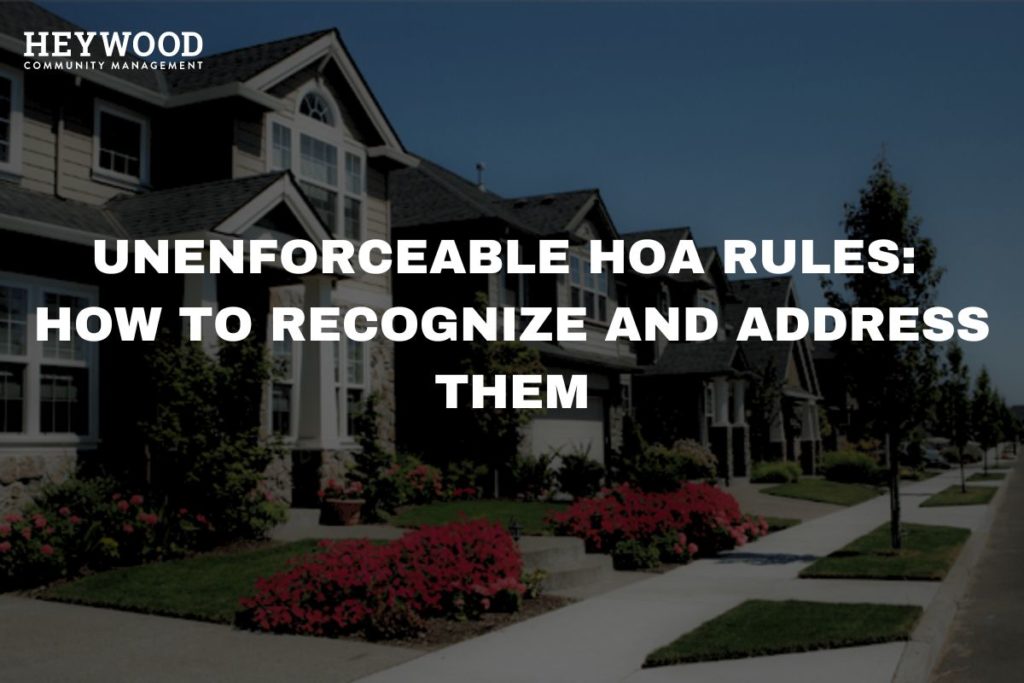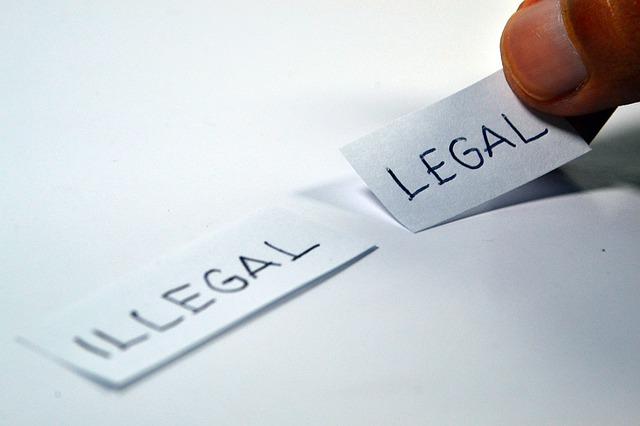 Homeowners Associations (HOAs) are responsible for creating and enforcing rules and regulations designed to maintain property values and promote harmony within the community. However, there may be instances where certain HOA rules are considered unenforceable.
Understanding what constitutes unenforceable HOA rules and how to address them is essential for homeowners living in an HOA-governed community.
In this comprehensive guide, we’ll delve deeper into the world of HOA rules and explore various scenarios in which these regulations may be unenforceable.
Homeowners Associations (HOAs) are responsible for creating and enforcing rules and regulations designed to maintain property values and promote harmony within the community. However, there may be instances where certain HOA rules are considered unenforceable.
Understanding what constitutes unenforceable HOA rules and how to address them is essential for homeowners living in an HOA-governed community.
In this comprehensive guide, we’ll delve deeper into the world of HOA rules and explore various scenarios in which these regulations may be unenforceable.
What are HOA Rules?
HOA rules, often found in a community’s Declaration of Covenants, Conditions, and Restrictions (CC&Rs), are a set of guidelines and regulations that dictate how homeowners within the association must behave and maintain their properties. These rules can cover a wide range of topics, such as architectural guidelines, landscaping requirements, pet restrictions, and noise limitations, among others. The primary goal of HOA rules is to protect the community’s aesthetic appeal and ensure a pleasant living environment for all residents. Additionally, these rules often address common concerns and help maintain order in the community.What are Unenforceable HOA Rules?
Unenforceable HOA rules are regulations that cannot be legally enforced, either because they violate federal, state, or local laws, or because they are overly vague or arbitrary. These rules may be in conflict with a homeowner’s rights, or they may infringe on protected classes under fair housing laws. It is essential for both HOA board members and homeowners to understand which rules are unenforceable to avoid potential legal disputes.Are HOA Rules Even Legal?
 In general, HOA rules are legal and enforceable, as long as they are consistent with federal, state, and local laws, and they do not violate homeowners’ rights. However, unenforceable rules may still exist within an HOA’s governing documents.
It is crucial for homeowners to review the rules and regulations of their community to ensure they are compliant with the law and do not infringe on their rights. In some cases, outdated or poorly drafted rules may need to be revised or amended to remain enforceable.
In general, HOA rules are legal and enforceable, as long as they are consistent with federal, state, and local laws, and they do not violate homeowners’ rights. However, unenforceable rules may still exist within an HOA’s governing documents.
It is crucial for homeowners to review the rules and regulations of their community to ensure they are compliant with the law and do not infringe on their rights. In some cases, outdated or poorly drafted rules may need to be revised or amended to remain enforceable.
HOA Rules That Are Unenforceable:
HOA rules that are unenforceable can create confusion and frustration among homeowners, as well as lead to potential legal disputes within the community. It is important for both HOA board members and homeowners to be aware of the various types of unenforceable rules to prevent misunderstandings and promote a harmonious living environment. There are several types of unenforceable HOA rules, which include but are not limited to:1) Discriminatory Rules:
Rules that target or discriminate against specific groups of people based on race, religion, gender, age, or other protected classes under federal and state fair housing laws are unenforceable. For example, an HOA rule that prevents families with children from using common areas would be considered discriminatory and unenforceable.2) Overly Restrictive Rules:
Rules that are overly restrictive or infringe on a homeowner’s rights to use and enjoy their property may be considered unenforceable, particularly if they violate state or local laws. An example of an overly restrictive rule might be one that prohibits all types of outdoor decorations, even when the decorations are not offensive or disruptive to the community.3) Rules Conflicting With State or Federal Laws:
If an HOA rule directly conflicts with state or federal law, such as attempting to override a state law on solar panel installations or attempting to enforce an illegal rental restriction, it is unenforceable. Homeowners should be aware of their state and local laws to identify potential conflicts with their HOA’s rules.4) Vague or Ambiguous Rules:
Rules that are unclear or open to multiple interpretations can be difficult to enforce, as they may not provide adequate guidance for homeowners or the HOA board. Ambiguous rules can lead to inconsistent enforcement and may create confusion and frustration among homeowners.5) Retroactive Rules:
Rules that attempt to apply retroactively, or impose new regulations on existing homeowners, are often unenforceable. For instance, if an HOA creates a new rule prohibiting certain types of fencing after homeowners have already installed their fences, the rule would be unenforceable against those existing fences.6) Rules Enforced Without Authority:
HOA rules that are enforced without proper authority or those that exceed the HOA’s legal powers can be deemed unenforceable.7) Rules Enacted Without Majority Vote:
Some HOAs may enact rules without the required majority vote from the community, making such rules unenforceable.How To Address Unenforceable HOA Rules?
Addressing unenforceable HOA rules requires a proactive approach that involves reviewing governing documents, understanding relevant laws, and engaging in open communication with the HOA board and fellow homeowners. By following these steps and seeking legal counsel when necessary, homeowners can help ensure a fair and harmonious community, while protecting their rights and interests. If you believe an HOA rule is unenforceable, consider taking the following steps:- Review your community’s governing documents and familiarize yourself with the specific rule in question. Take note of any inconsistencies or contradictions within the documents, as they might strengthen your case.
- Research federal, state, and local laws that may conflict with the unenforceable rule. Understanding the legal landscape will help you better articulate your concerns and determine the best course of action.
- Speak with your HOA board or HOA management company to discuss the issue and seek clarification or potential resolution. Open communication is essential for fostering a harmonious community, and many issues can be resolved through discussion and negotiation.
- Consult with an attorney experienced in HOA law to determine your legal options. If the unenforceable rule is causing significant hardship or infringing on your rights, an attorney can help you navigate the legal process and advocate for your interests.
- If necessary, work with your fellow homeowners to petition for a change or amendment to the unenforceable rule, following the proper procedures outlined in your HOA’s governing documents. Collecting signatures from a majority of homeowners may be required to effect change, so be prepared to engage your neighbors in the process.
How Do HOAs Enforce Rules?
To ensure compliance, HOAs typically enforce rules through warnings, fines, and, in severe cases, legal action. Effective enforcement requires clear communication of the rules and consistent application.Understanding is Key
While most HOA rules are designed to protect the community’s best interests, it is essential to recognize that not all rules are enforceable. By understanding the types of unenforceable rules and the steps to address them, homeowners can better advocate for their rights and ensure a fair and harmonious living environment. It’s crucial to stay informed about your rights as a homeowner and to work collaboratively with your HOA board and neighbors to maintain a thriving, well-managed community.Heywood Community Management specializes in homeowners' association (HOA) management in Arizona and surrounding areas such as Gilbert, Chandler, Tempe, Mesa, Queen Creek, Scottsdale, Phoenix, and more. Heywood HOA Management has actively been a part of Arizona's Real Estate market since 1933. With a single focus on community association management, Heywood Community Management is dedicating its resources to raising the community management standard of quality.
HOA business tips, intriguing topics, and freebies straight to your inbox.
Join the subscribers who get our content first.
No charge. Unsubscribe at anytime.

